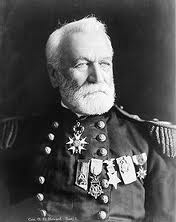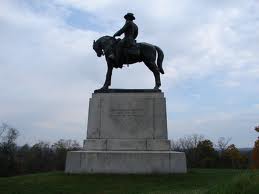 Maine Patriot, Oliver Otis Howard, known as the Christian General, endured humiliating defeats, triumphant victories in the west and was also awarded the Medal of Honor. His Maine tenacity could be grating to some, his humble demeanor could be misconstrued and didn’t impress subordinates, alienating many of the immigrant troops under his direct command. Popular or not, O.O. Howard, Maine Patriot, eventually found lasting acclaim while serving under General Sherman during the Georgia and Carolina campaigns. Sometimes battlefield success depends on not where one serves, but who one serves under.
Maine Patriot, Oliver Otis Howard, known as the Christian General, endured humiliating defeats, triumphant victories in the west and was also awarded the Medal of Honor. His Maine tenacity could be grating to some, his humble demeanor could be misconstrued and didn’t impress subordinates, alienating many of the immigrant troops under his direct command. Popular or not, O.O. Howard, Maine Patriot, eventually found lasting acclaim while serving under General Sherman during the Georgia and Carolina campaigns. Sometimes battlefield success depends on not where one serves, but who one serves under.
Oliver Otis Howard was born on November 8, 1830, in Leeds, Maine. Losing his father, a farmer, at age nine, Howard received a strong education at a series of academies in Maine, before attending Bowdoin College. Graduating in 1850, he decided to pursue a military career and sought an appointment to the U.S. Military Academy. Entering West Point that year, a classmate of J.E.B. Stuart and Custis Lee, he graduated fourth in a class of forty-six in 1854. Howard briefly became a mathematics professor at the Academy and studied theology under an Episcopalian priest, with the idea of going into the ministry. Marrying Elizabeth Waite in 1855, their marriage lasted for over fifty years and produced seven children.
 In 1857, after routine assignments on the East coast, Howard took part in the campaign against the Florida Seminoles. A lieutenant when Fort Sumter fell in April 1861, Howard put aside his ministerial plans and devoted himself to the Union cause. He was made colonel of the 3rd Maine Regiment of volunteers in June, and lost no time in taking his regiment to Washington, D.C. to train. There he was quickly switched to leadership of a brigade. By July, within two months of being promoted from lieutenant, he was leading a full brigade into battle at First Bull Run. Although his brigade was routed along with the rest of the Union army in that battle, he was promoted to brigadier general two months later, in September 1861. Howard and his men joined General McClellan’s newly formed Army of the Potomac and in the spring of 1862, his brigade moved south for the Peninsula Campaign.
In 1857, after routine assignments on the East coast, Howard took part in the campaign against the Florida Seminoles. A lieutenant when Fort Sumter fell in April 1861, Howard put aside his ministerial plans and devoted himself to the Union cause. He was made colonel of the 3rd Maine Regiment of volunteers in June, and lost no time in taking his regiment to Washington, D.C. to train. There he was quickly switched to leadership of a brigade. By July, within two months of being promoted from lieutenant, he was leading a full brigade into battle at First Bull Run. Although his brigade was routed along with the rest of the Union army in that battle, he was promoted to brigadier general two months later, in September 1861. Howard and his men joined General McClellan’s newly formed Army of the Potomac and in the spring of 1862, his brigade moved south for the Peninsula Campaign.
While on the Peninsula on June 1, 1862, Howard was wounded twice in the right arm leading his brigade in a charge at Fair Oaks, the second of the wounds shattered the bone near the elbow and the arm had to be amputated. Oliver Otis Howard would receive the Medal of Honor for his valiant efforts at Fair Oaks on March 29, 1893, the citation reads,
“Led the 61st New York Infantry in a charge in which he was twice severely wounded in the right arm, necessitating amputation.”
Three weeks after the Second Battle of Bull Run, at the battle of Antietam, he relieved wounded division commander John Sedgwick and would retain the command until the end of the year. That fall, he was promoted to major-general on November 29, 1862 and continued to lead his division through the Battle of Fredericksburg in December. There they were one of the unlucky divisions chosen for the futile, bloody assaults thrown
against Marye’s Heights. Within the span of three months, Howard had thus been
associated with the Second Division in two of the worst disasters to befall any
such command during the Civil War.
On April 1, 1863, Howard replaced Major General Franz Sigel as commander of the Army of the Potomac’s 11th Corps. Sigel was a native of Germany, and the change in command was not popular with the men of the 11th Corps, who were mostly German immigrants. At Chancellorsville, Howard’s men were again on the wrong end of a Confederate flank attack, this one being the famed assault of Stonewall Jackson, the same assault which ultimately led to Jackson’s accidental and eventually fatal wounding by his own men.
At Gettysburg, when his 11th Corps troops had been driven back from their positions north of town, on July 1, it was Howard who had left a brigade of Union troops on Cemetery Hill, preparing a fall back defensive position for Union forces which guaranteed Federal control of the crucial high ground, the same high ground which Union soldiers successfully defended on July 2 and July 3. Despite Hancock’s written orders, taking command, Howard resisted ceding control of the battle. Remaining on the defensive, XI Corps turned back Confederate attacks the next day. Though criticized for his performance, Howard later received the thanks of Congress for selecting the ground on which the battle would be fought.
On September 23, 1863, Howard and his corps were detached from the Army of the Potomac and sent under the command of Major General Joseph Hooker to help defend the city of Chattanooga, Tennessee, which was being besieged by Confederate General Braxton Bragg’s Army of Tennessee. On November 25, Howard’s Corps participated in the successful assault on Missionary Ridge that forced Bragg’s retreat into Georgia.
Howard remained in Chattanooga until April 10, 1864, when Major General Sherman selected him to lead the 4th Corps of the Army of the Cumberland. Howard served in that position throughout much of the Atlanta Campaign. On July 27, 1864, following the death of Major General McPherson during the Battle of Atlanta on July 22, Sherman appointed Howard to command the Army of the Tennessee. Howard continued in that capacity throughout Sherman’s March to the Sea. At the conclusion of that campaign, Howard was promoted to brigadier general in the regular army, effective December 21, 1864. During the Carolinas Campaign, Howard’s Army of the Tennessee formed the right-wing of Sherman’s invasion force. On March 13, 1865, Howard was breveted to major-general in the regular army for his gallantry at the Battle of Ezra Church, during the Atlanta Campaign. Toward the end of the Carolinas Campaign, Howard’s men played an important role at the Battle of Bentonville and Howard was present when Confederate General Joseph E. Johnston surrendered his forces to Sherman at Bennett Place, near Durham, North Carolina, on April 26, 1865.
 After the Civil War, the Maine Patriot, was appointed head of the Freedman’s Bureau, which was designed to protect and assist the newly freed slaves. In this position, Howard
After the Civil War, the Maine Patriot, was appointed head of the Freedman’s Bureau, which was designed to protect and assist the newly freed slaves. In this position, Howard
quickly earned the contempt of white Southerners and many Northerners for his support of black suffrage and his efforts to distribute land to African-Americans. He was also fearlessly candid about expressing his belief that the majority of white Southerners would be happy to see slavery restored. He even championed freedom and equality for former slaves in his private life, by working to make his elite Washington, D.C., church racially integrated and by helping to found an all-black college in the District of Columbia, which was soon named Howard University in his honor.
In 1874, he assumed command of the Department of the Columbia with his headquarters in the Washington Territory. While out west, Howard took part in the Indian Wars and in 1877 mounted a campaign against the Nez Perce which resulted in the capture of Chief Joseph. Returning east in 1881, he briefly served as superintendent at West Point before taking command of the Department of the Platte in 1882.
Howard retired from the Army, in 1894, after serving as commander of the Department of the East. O.O. Howard was one of the founders of the Lincoln Memorial University in Harrogate, Tennessee, chartered by the State of Tennessee on February 12, 1897.
 Lecturing and writing in retirement, the Maine Patriot, died on October 26, 1909, at his home in Burlington, Vermont and is buried at Lake View Cemetery.
Lecturing and writing in retirement, the Maine Patriot, died on October 26, 1909, at his home in Burlington, Vermont and is buried at Lake View Cemetery.
On November 12, 1932, the State of Maine dedicated an equestrian statue of Howard on Cemetery Hill at the Gettysburg National Military Park. The inscription reads,
Erected to the memory of Major General Oliver Otis Howard and the citizens of Maine who served their country in the Civil War
Maine Patriot, Oliver Otis Howard, nicknamed the Christian General, was not only a humble and dedicated military servant, but a guardian of the Republic during the savage struggle of the Civil War.
Bummer


Howard’s reputation during Reconstruction followed him to the West – he was seen as one of the less bloodthirsty commanders in the Indian Wars. Seems like he was one man who didn’t let war change him.
Louis,
Maybe Howard’s ethic is indicative of Maine’s career Officers of the era. A tenacity and moral character that permeates all aspects of their lives.
Bummer
05/22/13 Readers- Historical footnote and primary source, re: the selection of the high ground on Cemetery Ridge by the AOP in Gettysburg on July 1, 1863:
While much has been written by participants like Fitzhugh Lee (1896), James Longstreet, Col Taylor, and others regarding the topography of Gettysburg and the strategic defensive advantage and importance Cemetery Ridge offered to the Union (AOP), I never really understood its initial selection during the confusion of the meeting and first day’s engagement between Heth and Buford and later Reynolds.
A ‘primary’ source, written by a 15 yr. old girl and Gettysburg resident, privately published in 1889, sheds more information on this seminal AOP strategic defensive line site selection. Tillie (Pierce) Alleman writes that ….”to some like Professors Jacobs and Stower (either Lutheran College and Theological Seminary or Pennsylvania (later Gettysburg) College), came the occasion and pointing out to the Union officers the impregnable positions of the locality, and by this means insuring victory to our arms.”
I thought that you would be interested in this primary source cited below.
Source: “At Gettysburg or What A Girl Saw And Heard Of The Battle” by Mrs. Tillie Pierce Alleman
I thought that you would be interested in this primary source cited below.
Source: “At Gettysburg or What A Girl Saw And Heard Of The Battle” by Mrs. Tillie Pierce Alleman
Copyright 1888;
ISBN: 1-879664-20-8;
p.16.
JER
John,
Thanks for the fascinating primary source from Mrs Tillie Pierce Alleman. It almost seemed as though the selection of the “high ground” might have been in dispute or possibly just between who should really get the official credit.
Bummer